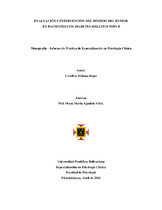Evaluación e intervención del sentido del humor en pacientes con Diabetes Mellitus tipo II

View/
Date
2013-08-28Author
Molano Rojas, Carolina
xmlui.dri2xhtml.METS-1.0.item-advisor
Agudelo Vélez, Diana María
xmlui.dri2xhtml.METS-1.0.item-type
book
Citación
Metadata
Show full item recordDocuments PDF
Abstract
En Colombia, las enfermedades crónicas como la diabetes, constituyen uno de los principales problemas de salud; se estima que el 7% de la población mayor de 30 años tiene diabetes tipo II y cada año aumenta la diabetes tipo I en menores de 15 años. El diagnóstico y tratamiento de este tipo de enfermedades supone un impacto en la vida del sujeto y un cambio en su estilo de vida que está guiado por factores psicológicos y emocionales. Con el fin de contribuir al desarrollo de estrategias de intervención más efectivas y eficaces, para mejorar la calidad de vida del paciente que tiene diabetes y aportar al trabajo de nuevos campos de estudio relacionados con la psicología de la salud, se desarrolló el presente trabajo, que consiste en un plan de evaluación e intervención psicológica, con una muestra de 10 pacientes diagnosticados con diabetes mellitus tipo II, 4 hombres y 6 mujeres, en edades entre 37 y 78 años, vinculados a la Fundación Santandereana de Diabetes y Obesidad FUSANDE. Los instrumentos utilizados en la evaluación fueron: el el State-Trait Cheerfulness Inventory (STCI), la Escala de Estrés y Ansiedad Social (SAD), la Escala de Miedo a la Evaluación Negativa (FNE), el Inventario de Depresión de Beck (BDI), el Inventario de Depresión Estado – Rasgo (IDER), la Escala de Gelotofobia (GELOPH 15) y la Escala de Apreciación del humor (EAHU), en los resultados se encontró que el mayor porcentaje de los participantes tuvo puntuaciones significativas en las siguientes escalas: en baja alegría 5 (70%) y mal humor 1 (50%) del STCI, que hacen referencia a un estilo de interacción generalmente poco alegre, y al predominio del mal humor; y en la escala de Gelotofobia relacionada con el miedo a causar algo que resulte risible para los otros (50%). En relación a la depresión, sólo el 20% de los sujetos mostraron altas puntuaciones. En la escala de Apreciación del Humor EAHU, se identificó mayor diversión, especialmente en los items relacionados con humor sin sentido e incongruencia resolución, y mayor aversión en los items de humor negro. En los resultados del proceso de intervención individual y grupal, se resalta el desarrollo del pensamiento flexible y la promoción de emociones positivas como estrategias de afrontamiento ante la condición de enfermedad. In Colombia, chronic diseases as diabetes constitute one of the principal health problems. It is estimated that 7 % of the people older than 30 has Type II diabetes and every year the Type I diabetes increases in people 15 years old and younger. The diagnosis and treatment of this type of diseases supposes an impact in the lifestyle of the subject that is guided by psychological and emotional factors. In order to contribute to the development of the most effective intervention strategies, to improve the quality of life of the patient who has diabetes and to reach to the work of new fields of study related to the health psychology, this work has been developed. This work consists of a plan of evaluation and psychological intervention with a sample of 10 patients diagnosed with Type II diabetes mellitus, 4 men and 6 women between 37 and 78 years old, linked to the Fundación Santandereana de Diabetes y Obesidad - FUSANDE. The instruments used in the evaluation were: the State-Trait Cheerfulness Inventory (STCI), the Scale of Stress and Social Anxiety (SAD), the Fear of Negative Evaluation scale (FNE), the Beck's Depression Inventory (BDI), the Inventory of Depression State - Feature (IDER), Gelotophobia Scale (GELOPH 15) and the Humor Assessment Scale (EAHU). In the results it was found that the major percentage of the participants had significant punctuations in the following scales: in low happiness 5 (70 %) and bad mood 1 (50 %) of the STCI, which refer to a generally little happy interaction style, and to the predominance of bad mood; and in the Gelotophobia scale related to the fear of causing something laughable for others (50 %). In relation to the depression, only 20% of the subjects showed high punctuations. In the Humor Assessment Scale (EAHU) major amusement was identified, especially in the articles related to senseless humor and incongruity resolution; and major distaste for black humor. In the results of the process of individual and group intervention, the development of flexible thought and the promotion of positive emotions as strategies of confrontation before the condition of disease is highlighted.
Keyword/s
Psicología
Tesis y disertaciones académicas
Psicología clínica
Depresión
Ansiedad
Gelotofobia
Collections
- Trabajos de grado [6374]

